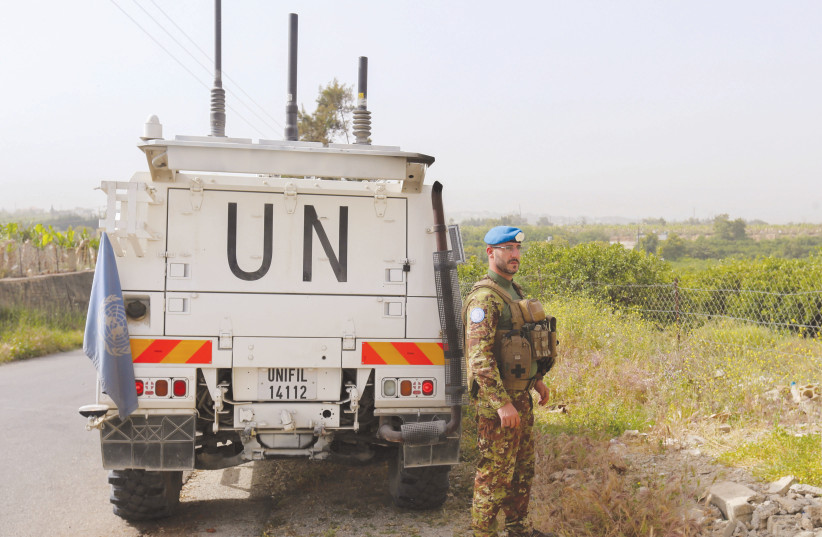Standoffs between the IDF and the Lebanese army could escalate with serious consequences, United Nations Secretary-General Antonio Guterres told the Security Council in a 19-page report on the deteriorating situation along Israel’s northern border.
“Continued incidents and posturing near the Blue Line, including firing in the air, the use of smoke and stun grenades, epos pointing and stone-throwing are of concern,” Guterres wrote in a report he issued to the UNSC.
“Direct stand-offs between the IDF and the Lebanese Armed Forces as well as between individuals and the IDF, have the potential to lead to escalation with serious consequences."
He urged the parties to utilize the tripartite format of UNIFIL to resume discussions on outstanding contentious points along the Blue Line
The document dealt with the three-month period from February 21 to June 20 and focused on Israeli and Lebanese violations of the cease-fire terms of the Second Lebanon War set out in UNSC Resolution 1701.

The UNSC discussed his report in a closed-door session Thursday in advance of an annual vote next month to renew the mandate of the peacekeeper force along the northern border known as the UN Interim Force in Lebanon composed of 9,516 military personnel from 49 contributing countries.
Guterres described a volatile period that included rocket fire against Israel from the Lebanese territory and IDF standoffs with the Lebanese army, as the non-state military groups such as Hezbollah and the Popular Front for the Liberation of Palestine further entrenched themselves on the northern border.
The tensions took place at a time of continued instability in Lebanon, Guterres explained, noting that the “political status quo” in the country was “unsustainable.”
UN Special Coordinator for Lebanon Joanna Wronecka and UN Under-Secretary-General for Peace Operations Jean-Pierre Lacroix presented the report to the UNSC, with the former calling for political stability in Lebanon.
She echoed Guterres in appealing to Israel and Lebanon to avoid any steps that would escalate tensions and to fully respect Resolution 1701.
“We should move towards resolution 1701, not away from it. The full implementation of resolution 1701 remains our primary raison d’être,” she said.
Guterres says Israel violated Resolution 1701
In his report, Guterres urged the IDF to halt its violations of Lebanese airspace, noting there had been 131 such breaches during the reporting period. The violations accounted for 187 hours and seven minutes of time in Lebanese airspace, of which drones accounted for 85% of that traffic.
Other Resolution 1701 violations he took issue with were the IDF’s continued “occupation” of the northern part of the border town of Ghajar and other “areas north of the blue line” as well as “groundwork” in Sheba Farms and construction of a T-wall in a Lebanese “reservation area.”
But his most serious concerns were directed at Hezbollah and the Lebanese army for failing to demilitarize the area close to the border with Israel, for not disarming non-state actors and for failing to insure UNIFIL access to all sites slated for inspection.
“Notwithstanding repeated requests” from the Lebanese Army “UNIFIL has yet to gain full access to several locations of interest, including Green Without Border sites, the tunnels crossing the Blue Line and the four unauthorized firing ranges,” Guterres wrote.
It also has not been able to access a rocket launch and impact site near Zibqin, he added.
The buildup of illegal Hezbollah arms on Israel’s northern border is very worrying and Lebanon’s failure to allow peacekeepers to fully monitor the situation is “unacceptable," United Nations Secretary-General Antonio Guterres has told the Security Council.
“I remain seriously concerned with the presence of unauthorized weapons in the area between the Litany River and the Blue Line,” Guterres said.
He noted in addition the placement of 18 containers and six watchtowers north of the Blue Line. “Twelve of the sites have signs of Green Without Borders. UNIFIL experienced restrictions on movement close to the container sites on several occasions,” he said. The Lebanese Army has not responded to UNIFIL's request to remove the containers, he added.
The Lebanese Army in other ways worked with UNIFIL to halt Hezbollah’s activities between the Blue Line and the Litani River, including maintaining 16 permanent checkpoints and 79 temporary ones as well as 489 counter-rock-launch operations per month.
Overall in that three-month period, UNIFIL undertook 14,034 operational activities, of which 6,193 were air or foot patrols, he explained.
Foreign Minister Eli Cohen urged France to help prevent a military conflict with Hezbollah along Israel’s northern border in Lebanon during a one-day trip he took to Paris on Wednesday.
He made his appeal during a meeting with French Foreign Minister Catherine Colonna.
"The provocation of the terrorist organization Hezbollah on the Lebanese border could degenerate into a military confrontation,” Cohen said.
“I asked my friend, Foreign Minister Colonna, to exercise France's influence in Lebanon in order to help resolve the tensions efficiently and quickly,” Cohen said.
France, which controlled Lebanon from the fall of the Ottoman Empire and until 1946, maintains a special relationship and interest in that country.
